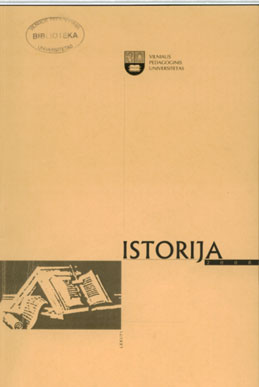V. Kapsuko ir Z. Angariečio revoliucinės komunistinės etikos bruožai XX a. I pusėje
Revolutionary Communist Ethics of V. Kapsukas and Z. Angarietis (the first half of the 20th century)
Author(s): Edvardas KriščiūnasSubject(s): History
Published by: Vytauto Didžiojo Universitetas
Keywords: Z. Angarietis; V. Kapsukas; proletarian ethics; system; hostility; revolutionary moral principles
Summary/Abstract: The article analyzes communist ethical standpoint/values of two famous Lithuanian communist leaders Zigmas Angarietis and Vincas Kapsukas; it also reconstructs the principles of their revolutionary morale which they propagated in the communist press in the 1st half of the 20th century. Z. Angarietis’ and V. Kapsukas’ ethical views were influenced by revolutionary struggle as well as the principles of Marxist philosophy, and communist ethics became the theory of their lifestyle. Z. Angarietis actively propagated the principle that moral norms and ethical theories are completely dependent on the interests of social layers and societal classes. He was also a staunch advocate of the theory of relativistic ethics. Lithuanian Marxists rejected the norms of Christian ethics, Decalogue, and human moral philosophy. They promoted theoretical attitude that two opposite ethics existed in the society of that period, i. e. bourgeois and proletarian ones and that they reflected economic and political requirements of two hostile classes. While the bourgeois moral philosophy justified exploitation, the proletarian one aimed to abolish this exploitation in a revolutionary way. Therefore, revolutionary struggle becomes the cornerstone of communist moral philosophy; whatever serves communist revolution, is ethical. The basis for Z. Angarietis’ and V. Kapsukas’ revolutionary ethical principles was armed communist revolution, i. e. only efficient, of heroic soul, communists united into a centralized Communist party can achieve the ‘great’ historical aim - to build communism. The main principles of the communist moral philosophy were devotion to the revolutionary struggle and Communist party, revolutionary activities and heroism. According to V. Kapsukas the most outstanding example of communist ethics was Karolis Požėla who sacrificed his life for the victory of revolution.
Journal: Istorija. Lietuvos aukštųjų mokyklų mokslo darbai
- Issue Year: 71/2008
- Issue No: 3
- Page Range: 49-55
- Page Count: 7
- Language: Lithuanian

